By Sarah Saad
Martyrdom has taken on a humanitarian dimension, stemming from the belief that protecting the homeland is a sacred duty and a means to please God.
There is no doubt that each martyr has his own story with martyrdom, and throughout history, Egyptians have introduced legendary sacrifices that were made to protect Egypt.
Since Egypt’s unification during the reign of King Menes, over 5,200 years ago, the numerous military victories of the Egyptian army have been affirmed. These victories have been affirmed since the time of the pharaohs, starting with King Senusret (the father of the Egyptian army) who protected Egypt against attacks from the south and east.
This continued with the reign of King Seqenenre Tao in confronting the Hyksos until his son Ahmose I defeated them, and Thutmose III in the Battle of Megiddo and Ramesses II in the Battle of Kadesh, as well as in the Islamic conquests, the battles against the Crusaders and the Mongols in the Battle of Hattin and the Battle of Ain Jalut, as well as in the Egyptian conquests and victories during the reign of Muhammad Ali and his sons, with the martyrs falling serving as evidence of Egyptian military sovereignty.
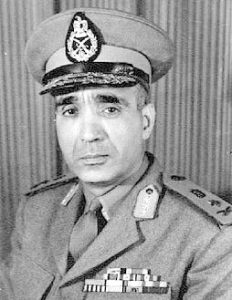
Symbol of Egyptian martyrs
Egypt celebrates the anniversary of the Day of the Martyr on March 9 each year, as a call to the nation’s memory, to realise and recognise the sacrifices made by the heroes of the Egyptian army to defend Egypt’s land, waters, and skies, and to reaffirm the spirit of loyalty and belonging to keep Egypt’s flag high and fluttering forever.
The choice of March 9 as a symbol for celebrating the Day of the Martyr came in commemoration of a dear memory to Egypt, namely the memory of Field Marshal Abdel Moneim Riad, former Chief-of-Staff of the Armed Forces, who was martyred while inspecting his army’s heroes on this day at crossing No. 6 east of the city of Ismailia after our forces achieved a great victory a day earlier (on March 8, in 1969), when the Egyptian artillery taught the Israeli forces occupying the eastern bank of the Suez Canal a lesson they would not forget by destroying the first Bar Lev Line.
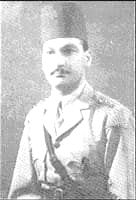
First clash with Israeli enemy before 1948 war
Col Ahmed Abdel Aziz, commander of the volunteers and fedayeen forces for the liberation of Palestine and the first to engage his elements with the Israeli enemy before the official declaration of war on May 15, 1948, was a model of the heroes of the Egyptian army.
After the declaration of war and the participation of the Egyptian forces in it, he was tasked with advancing on the southern axis: Beersheba, Hebron, and Jerusalem, to secure the right flank of the Egyptian forces.
He achieved brilliant victories and managed to seize Beersheba and Hebron, and was the first to storm into and enter the city of Jerusalem with his forces.
Col Abdel Aziz was martyred on December 23, 1948, while his forces were advancing towards Fallujah. Despite Col Abdel Aziz’s martyrdom, his forces carried out their tasks efficiently, having been inspired by the fighting spirit and greatness of his sacrifices.
Brave fighter who fears no death
As for combat pilot Naguib Abdel Aziz Bassioni, who was known among his commanders and peers as a fearless bridge during the Palestine war, he was the commander of the fighter/bomber squadron. He participated in supporting the combat operations of the Egyptian forces.
He courageously faced the major transformation that the Israeli Air Force received in support of this war from a number of Western countries and did not hesitate to engage in bold aerial battles against Western volunteers who joined the Israeli forces.
He was martyred on August 29, 1948, when he insisted on carrying out a special mission to bombard one of the Israeli settlements deep inside, and succeeded in carrying out the mission and causing great losses to the settlement. On his way back to his base, Bassioni’s jet was hit by Israeli ground defences.
Masters of the seas throughout history
Among the symbols of the martyrs of the Tripartite Aggression War in 1956 was Navy Captain Mohammed Shakir, who was the commander of the frigate Damietta, tasked with participating in protecting Egyptian territorial waters against the British-French invasion.
Despite the insistence of the hero and his success in causing great losses to those hostile forces, the commanders of these fleets requested air support to bombard the frigate Damietta, which resulted in direct hits to the frigate’s equipment.
At that moment, the commander of the English fleet requested the surrender of the frigate, but its commander, martyred Navy Captain Mohammed Shakir, refused and insisted on carrying on with the fight until the last bullet and man.
After fierce resistance, the hero was martyred on November 2, 1956, setting the highest example and the highest standard of love for the homeland and the honour of the Egyptian military.
Steadfastness and determination
Among the symbols of the martyrs of the June 1967 war is martyred Col. Alaa Gamgom, who was a staff officer and commander of one of the ambushes defending the area of Um Katif, west of the Al-Auja area in northern Sinai.
His forces in defensive positions were subjected to an armoured enemy attack, and in the face of our forces’ steadfastness, the Israeli forces were unable to achieve any breakthrough and retreated after suffering heavy losses, resulting in their siege lasting for more than 48 hours from June 5 to June 7, 1967.
Egypt’s dignity and the resilience of men
Continuing with Egypt’s heroes in the October 1973 war, we find among them the champion of resilience and the commander of the Kebrit epic, Major Ibrahim Abdeltawab. The previous wars did not witness conditions where a small military force was besieged like that, which occurred at the Kebrit site east of the lakes during the October 1973 war. The men of this site, which covered an area not more than one square kilometre, endured extremely harsh conditions of siege for more than three months without surrendering a single fighter, despite the difficult combat and administrative conditions surrounding them.
On the morning of October 9, 1973, the hero was tasked with moving north from his positions east of the canal to the south of the lakes to attack and storm the fortified enemy positions east of Kebrit and seize them and secure them. After fierce fighting, the battalion under his command managed to seize these fortified positions.
However, the Israeli forces attempted to regain these positions by launching several attacks, all of which failed, leading the enemy forces to impose a strong siege around the Egyptian forces there. While the hero was in his command centre, leading one of the raids against the enemy forces on January 14, 1974, he was hit by an enemy shell which caused him fatal injuries. He continued to bleed on the Sinai ground.
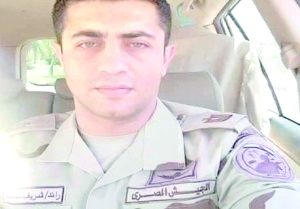
The Egyptian army: an ingrained doctrine
He is Captain Sharif Mohamed Omar, the son of Captain Mohamed Omar, the former technical director of Al-Ittihad Alexandria Club. He is also the nephew of Captain Shawky Gharib, the former coach of the Egyptian national team.
According to Sharif’s colleagues, when the mission was assigned to him, his direct commander asked him, “Is this place not too far for you, Sharif?” He replied: “There is nothing too far, sir.”
With these words, the heroic fighter Captain Sharif Mohamed Omar uttered his last words, before leaving our world, as he sought permission to inspect a highly-dangerous location.
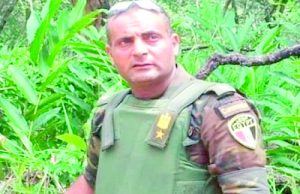
Defending Egypt
Col Ramy Hassanein told his family before departing: “I defend Egypt.” On October 29, 2016, news spread on social media about the martyrdom of a new hero from the Armed Forces, namely Col Ramy Hassanein who hailed from Beheira Governorate. He was targeted on October 29, after the armoured vehicle passed between the Sadat and Wahshi checkpoints, south of Sheikh Zuwaid, located between the cities of al-Arish and Rafah on the border with the Gaza Strip.
20-minute epic
Captain Hazem Abu Al-Ma’ati, the hero of the 20-minute epic in ‘Negev’ during the battle known as the ’20-minute epic’, Major Hazem Osama Abu Al-Ma’ati, who was then the commander of the Negev ambush, was martyred after a terrorist group attacked the ambush in the New Valley Governorate, which is located 80 kilometres away from the city of Kharga, on January 16, 2017.
I never leave my weapon
Egypt will never forget martyr Colonel Ahmed Abdel-Hameed Eldardiry, one of the heroes of the Armed Forces, who set a wonderful example of sacrifice and altruism, and who was martyred in the terrorist attack on one of Sinai’s ambushes, sacrificing himself so that his colleagues and soldiers could live.
His good manners; piety and his good behaviour among his colleagues and soldiers were wonderful qualities that the martyr possessed, in addition to his intense love for his homeland. The military heroism of the great heroes and leaders of the October War had instilled in the heart of Eldardiry a strong passion and love for military life, which prompted him to join the Military Academy, considering the war leaders as his role models in sacrifice and redemption.
He graduated from the Military Academy in the 93rd batch, specialising in the infantry. He then joined the Second Field Army in El-Qantara city in Ismailia after graduation. After this, Eldardiry travelled to Sudan to be part of the peacekeeping forces there in 2005, following his marriage three months earlier.
After completing his mission in Sudan, Eldardiry saw his only son, three months after his birth. He continued his service in the Second Field Army, then the Third Field Army, and during his service in El-Qantara, he submitted several requests, expressing his strong desire to participate in military operations in Sinai, Rafah, Sheikh Zuweid, or al-Arish, all of which were kept secret without the knowledge of his family or close associates.
It is worth noting that this work required the martyr to spend the night in each ambush consecutively. He performed his duties among his colleagues – soldiers and officers alike – in a prisoner-like atmosphere, sharing Ramadan iftars with them.
On July 1, 2015, a terrorist attack targeted six ambushes simultaneously around 6am. A booby-trapped car stormed the ambush, which was destroyed by the ambush forces before reaching it. Then four-wheel-drive vehicles, each carrying about 20 or 25 terrorist elements armed with rocket launchers, sniper rifles, and various weapons, stormed the ambush. Eldardiry managed to detonate two cars before they reached the ambush, where one of his fellow officers was martyred during the attempted ambush. This was followed by another attack by terrorists on motorcycles carrying machine guns, which were dealt with by the ambush forces, killing a large number of them. At this point, Eldardiry was injured in his right foot.
The martyr continued to fight until his other foot was injured. During this fierce battle, the ammunition of the ambush was about to run out, so he ordered his soldiers to take cover inside their armoured vehicles and go to another ambush to supply them with ammunition. However, the soldiers refused to leave him alone, but he insisted and asked them to take cover in the armoured vehicle from the heavy fire directed at them by the terrorist elements. Eldardiry remained with two of his soldiers protecting the backs of the rest of the soldiers until they returned with support and ammunition. During a moment when a bullet directed by one of the sniper terrorists penetrated Eldardiry’s neck, he breathed his last on Ramadan 14.
Martyring on day of graduation
Major Mustafa Hagagi Helmy was martyred on July 18, 2015, on the second day of Eid al-Fitr, during the targeting of the Abu Rafi ambush in Sinai. The strange thing about this day is that it was the same day that the martyr graduated from the Military Academy in 2009, being the top graduate of batch number 103. He made great sacrifices during the war on terrorism in Sinai.
He was always keen to gather with the members of his batch to participate in charitable works. He was supposed to return to his village of Al-Shaghb in Luxor during the Eid holiday to search for his life partner, but that did not happen, and he achieved what he wished for.
Mustafa requested to be transferred to Sinai after the martyrdom of Captain Ahmed Eldardiry, from the neighbouring city of Esna to their village, who was martyred in the terrorist attacks targeting the ambushes in North Sinai on July 1, 2015. He asked his leadership to replace the martyr Eldardiry at the ambush, although the martyr was a candidate for a better and a higher position within the Armed Forces. He took over his position at the ambush until he achieved the same martyrdom. The last time Mustafa returned to his hiding place, he collected all his belongings and put them in his car. He then closed the car, and gave its keys to one of his colleagues, asking him to hand them to his family because he was going to Sinai. He said: “I am the martyr who is due.” Indeed, his colleagues brought his private car, with all his belongings, as he himself had placed them.
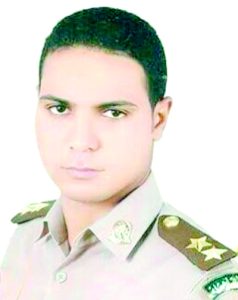
One of the recruits who accompanied him at the moment of martyrdom said, “A sudden shell fell on the ambush, and the only one who uttered the testimony more than once was martyr Mustafa Hagagi. This was on the second day of Eid. He was always keen on fasting, especially on Mondays and Thursdays throughout the year.”
He was close to everyone and loved by all members of his family. During his last meeting with them, at the iftar of a day in Ramadan, he prepared the iftar for the family himself. In the midst of the field, he was a leader in every sense of the word, committed to the Egyptian military, close to the members of his ambush, and his funeral was a scene that is difficult to describe, but his biography remains bright in the annals of history.
The names of the martyrs and those who sacrificed for the sake of Egypt will never be forgotten. They are Egypt’s pride, rich in their records which are written with letters of light that tell the stories of their martyrdom and their heroism that poured on the sands of the homeland. These stories are inherited by generations. They highlight the brilliance of Egyptian soldiers who defeated and taught their enemies lessons they will not forget. If they forget, the Egyptian army is capable, with the help of God, of dealing with all circumstances and at any time, so that Egypt remains a victorious homeland that bears witness to the defeats of its enemies and their disappointment.



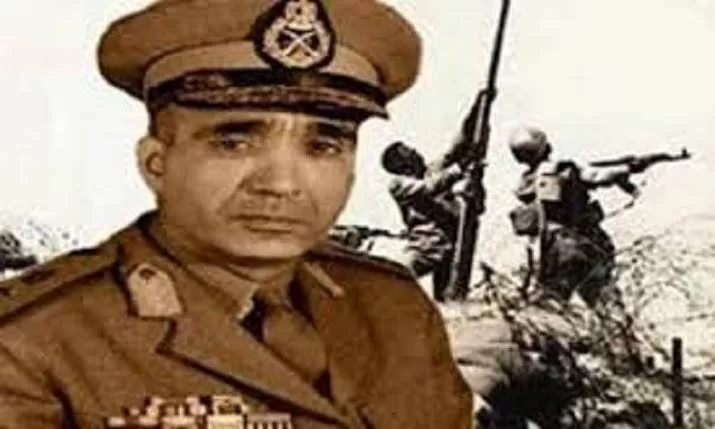


Discussion about this post